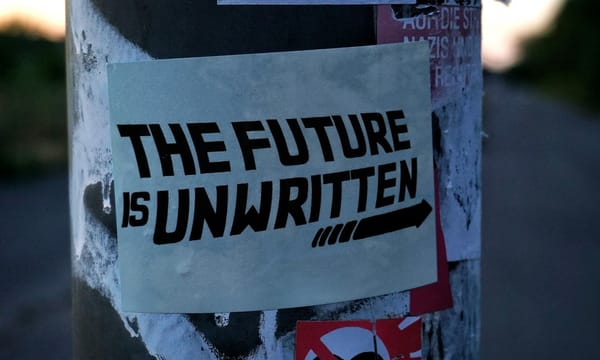Radical Resistance: 10 Queer Activists Resisting Authoritarianism
This post launches a blog series spotlighting activists offer us tools to outlive it authoritarianism. These ten organizers, writers, and cultural workers help us understand how power functions, how it targets the most vulnerable, and how we can disobey, disrupt, and dream anyway.

Authoritarianism thrives on control—over borders, bodies, desire, and memory. It silences dissent through fear and punishes those who refuse to conform. But queer BIPOC activists have always lived outside the boundaries of “acceptable” citizenship. Their existence alone is a form of rebellion. Their resistance work? A masterclass in survival, defiance, and future-building.
This post launches Queer Radical Resistance, a blog series spotlighting activists who don’t just fight back against authoritarianism, but offer us tools to outlive it. These ten organizers, writers, and cultural workers help us understand how power functions, how it targets the most vulnerable, and how we can disobey, disrupt, and dream anyway.
Each entry below includes:
- A snapshot of who they are
- What their resistance looks like in practice
- The authoritarian logics they challenge
- Themes to learn from
- Reading/viewing recommendations to deepen the work
1. Mariame Kaba
Abolitionist | Organizer | Educator
Mariame Kaba teaches that we don’t defeat authoritarianism by reforming it—we dismantle it through abolition, imagination, and collective care. Her resistance work spans prison abolition, youth organizing, mutual aid, and transformative justice.
Resistance in practice:
- Co-founded Project NIA to end youth incarceration
- Supported Black women survivors of state and interpersonal violence
- Writes and speaks on abolition as a world-building project, not just a critique
Challenges to authoritarianism:
- Punitive justice systems
- Criminalization of protest and survival
- Surveillance and carceral logic
Themes: Abolition, mutual aid, non-reformist reforms, hope as discipline
Start with: We Do This ’Til We Free Us, Project NIA
2. Tourmaline
Filmmaker | Archivist | Black Trans Futurist
Tourmaline insists that joy and imagination are not distractions, they’re weapons. Her films center Black trans life not as tragedy, but as defiant beauty and possibility. She works to preserve and uplift Black queer history as a resistance archive.
Resistance in practice:
- Directed Happy Birthday, Marsha! honoring Marsha P. Johnson
- Champions the idea that “there is no liberation without trans people”
- Merges archival recovery with present-tense survival
Challenges to authoritarianism:
- Historical erasure
- Cultural sterilization
- State-sponsored transphobia
Themes: Black trans liberation, archival justice, creative insurgency
Start with: Happy Birthday, Marsha!, Tourmaline’s IG & interviews
3. Dean Spade
Trans Legal Scholar | Mutual Aid Strategist
Dean Spade dissects how legal systems uphold white supremacy and authoritarianism—not through dramatic repression, but through bureaucratic cruelty. His work makes mutual aid strategic, not just charitable.
Resistance in practice:
- Organized grassroots legal defense projects for trans people
- Wrote the definitive book on mutual aid as political survival
- Critiques the nonprofit industrial complex from the inside
Challenges to authoritarianism:
- Legal technocracy
- State-managed gatekeeping
- Neoliberal dilution of radical work
Themes: Mutual aid, direct action infrastructure, anti-professionalism
Start with: Mutual Aid: Building Solidarity During This Crisis (and the Next), Big Door Brigade
4. Sylvia Rivera
Street Activist | Trans Revolutionary | STAR Co-Founder
Sylvia Rivera was a force of nature. She survived incarceration, homelessness, and systemic erasure and kept organizing. Her resistance was loud, messy, and public. She demanded that gay liberation include the most criminalized: trans women, sex workers, and poor people.
Resistance in practice:
- Co-founded STAR (Street Transvestite Action Revolutionaries) with Marsha P. Johnson
- Demanded inclusion of trans people in the Gay Rights Bill
- Disrupted NYC Pride to call out white gay complacency
Challenges to authoritarianism:
- Respectability politics
- Erasure of trans resistance
- Policing of poor queer people
Themes: Trans survival, street activism, militant care
Start with: STAR Manifesto, The Death and Life of Marsha P. Johnson (Netflix)
5. Andrea Ritchie
Police Misconduct Attorney | Abolitionist | Author
Andrea Ritchie exposes how the state criminalizes Black women, Indigenous women, and queer people of color, especially those who survive violence. Her legal and organizing work shows how authoritarianism punishes people for surviving.
Resistance in practice:
- Co-leads Interrupting Criminalization with Mariame Kaba
- Documents state violence against queer and trans people
- Merges legal expertise with grassroots power-building
Challenges to authoritarianism:
- Gendered policing
- Survivor criminalization
- Law enforcement impunity
Themes: Abolition, survivor justice, anti-carceral feminism
Start with: Invisible No More, Interrupting Criminalization
6. Leah Lakshmi Piepzna-Samarasinha
Crip Femme Poet | Disability Justice Organizer
Leah Lakshmi centers disability justice as anti-authoritarian practice. They remind us that fascism thrives on disposability, and that building interdependent care systems is both strategy and survival.
Resistance in practice:
- Co-created the Disability Justice Collective
- Facilitated community safety for disabled people during COVID
- Wrote about trauma, care, and resistance in queer disabled communities
Challenges to authoritarianism:
- Medical fascism
- Eugenics logics
- State abandonment during crisis
Themes: Disability justice, healing justice, mutual care networks
Start with: Care Work: Dreaming Disability Justice, Dirty River
7. adrienne maree brown
Movement Strategist | Sci-Fi Theorist | Pleasure Activist
adrienne maree brown fuses political strategy with organic, emergent thinking. Her work is a toolkit for movements operating under surveillance, chaos, and repression, centered on adaptation, resilience, and pleasure.
Resistance in practice:
- Wrote Emergent Strategy to guide decentralized movements
- Advocated for pleasure as a liberation principle, not a luxury
- Trains activists in conflict navigation and radical imagination
Challenges to authoritarianism:
- Rigid hierarchy
- Emotional burnout
- Disconnection from joy
Themes: Emergent strategy, decentralization, erotic power
Start with: Emergent Strategy, Pleasure Activism
8. Alok Vaid-Menon
Poet | Gender Theorist | Public Speaker
Alok unravels the gender binary as a mechanism of authoritarian control. They argue that trans and nonbinary people are deliberately targeted by the state because they refuse to be controlled.
Resistance in practice:
- Speaks internationally on anti-trans legislation and media violence
- Uses fashion and performance to challenge gender norms
- Bridges poetry, public grief, and political clarity
Challenges to authoritarianism:
- Gender essentialism
- Public shaming of trans bodies
- State-backed identity policing
Themes: Gender freedom, embodiment, anti-legibility
Start with: Beyond the Gender Binary, live performances, IG essays
9. Kai Cheng Thom
Therapist | Poet | Conflict Worker
Kai Cheng Thom works at the emotional fault lines of resistance—where trauma, conflict, and shame can fracture movements from within. Her work challenges both authoritarianism and internal movement authoritarianism.
Resistance in practice:
- Facilitates transformative justice responses to harm
- Writes about healing as political action
- Advocates for “fierce vulnerability” over binary thinking
Challenges to authoritarianism:
- Punitive movement culture
- Trauma cycling
- Emotional repression
Themes: Transformative justice, conflict repair, community accountability
Start with: I Hope We Choose Love, Falling Back in Love with Being Human
10. Miss Major Griffin-Gracy
Elder | Abolitionist | Formerly Incarcerated Trans Leader
Miss Major has survived prison, poverty, state violence, and transphobia and still laughs with joy. Her resistance legacy spans decades of abolitionist, anti-policing, and trans survival work. She is the movement’s grandmother and one of its fiercest protectors.
Resistance in practice:
- Led the Transgender Gender-Variant Intersex Justice Project
- Supports incarcerated trans women
- Advocates for liberation over inclusion
Challenges to authoritarianism:
- Incarceration of trans women
- Respectability-driven liberalism
- Youth-disconnected movements
Themes: Abolition, intergenerational resistance, trans resilience
Start with: MAJOR! (documentary), her interviews and oral histories
This Series: What Comes Next
Each of these activists will get a full deep-dive post in the Queer Radical Resistance series. We’ll explore:
- What authoritarianism looked like in their time and context
- How they fought back
- What tactical lessons we can carry forward
- How to apply their insights to our current moment
Resistance is not one-size-fits-all. These voices remind us that defiance takes many forms: study, care, disruption, ritual, visibility, refusal.
The point is to do it together and to do it now.
Sources & Further Reading
- Kaba, M. (2021). We Do This ’Til We Free Us. Haymarket Books.
- Spade, D. (2020). Mutual Aid. Verso.
- Ritchie, A. (2017). Invisible No More. Beacon Press.
- Piepzna-Samarasinha, L. L. (2018). Care Work. Arsenal Pulp Press.
- Thom, K. C. (2019). I Hope We Choose Love. Arsenal Pulp Press.
- brown, a. m. (2017). Emergent Strategy. AK Press.
- Vaid-Menon, A. (2020). Beyond the Gender Binary. Penguin.
- Happy Birthday, Marsha! (2018). Directed by Tourmaline and Sasha Wortzel.
- MAJOR! (2015). Directed by Annalise Ophelian.



